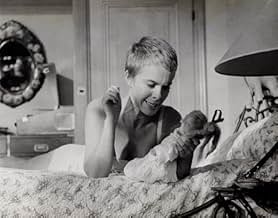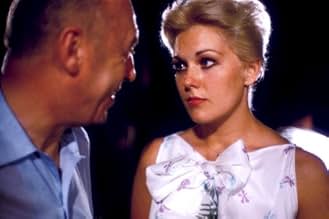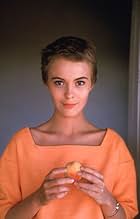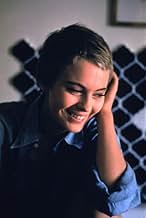VALUTAZIONE IMDb
6,8/10
6008
LA TUA VALUTAZIONE
Cecile è una giovane ragazza decadente che vive con il suo ricco padre playboy, Raymond. Quando Anne, la vecchia amante di Raymond, arriva nella villa, Cecile ha paura del suo modo di vivere... Leggi tuttoCecile è una giovane ragazza decadente che vive con il suo ricco padre playboy, Raymond. Quando Anne, la vecchia amante di Raymond, arriva nella villa, Cecile ha paura del suo modo di vivere.Cecile è una giovane ragazza decadente che vive con il suo ricco padre playboy, Raymond. Quando Anne, la vecchia amante di Raymond, arriva nella villa, Cecile ha paura del suo modo di vivere.
- Regia
- Sceneggiatura
- Star
- Nominato ai 1 BAFTA Award
- 2 candidature totali
Tutte Lemkow
- Pierre Schube
- (non citato nei titoli originali)
Maryse Martin
- Undetermined Secondary Role
- (non citato nei titoli originali)
Edouard F. Médard
- Bit part
- (non citato nei titoli originali)
Jackie Raynal
- Dancer
- (non citato nei titoli originali)
Recensioni in evidenza
Jean Seberg is an absolute joy. I just wanna give her a big fat hug and kiss... well that's just two things anyway. What makes Otto Preminger's film so wonderful is that Seberg is the right age to play the part of a spoiled rich girl coming of age. Also the film is given an authenticity and heart because it was written by Françoise Sagan when she was the same age as Cecile (Seberg). That's right, this amazing and brilliant work was penned by a 17-year old.
The plot is fairly standard. A young girl living with her playboy father becomes jealous of his new love and when marriage is proposed she does her best to break it up. Gee nothing remarkable there. What is remarkable is the characters and their relationships. They have an extra amount of depth and the situation between Cecile and her father, Raymond (David Niven) borders on the incestuous. This gives it an added dimension and depth when Anne (Deborah Kerr) threatens to "steal" her father away. Another place where it avoids clichés is dealing with Anne. Kerr plays her magnificently and with a warm passion. She is not the wicked step mother here, but a sympathetic and self sacrificing woman who wants to bring love and stability into Cecile and Raymond's morally ambiguous and flighty lifestyle. This film while a modest success in America was a huge hit in Europe and inspired Jean-Luc Godard to work with Seberg.
Bonjour Tristesse also foreshadowed the films dealing with the idle rich that quickly popped up in its wake including two masterpieces, Antonioni's L'avventura and Fellini's La Dolce Vita. Preminger directs Bonjour Tristesse with a sure hand and I love how the flashbacks are in color and the present day scenes are in a somber black and white to fit with the mood. Oh and yes the story is told in flashback for the most part and the technique along with Seberg's narration gives a heightened sense of loss that Cecile and Raymond feel towards the events that transpired concerning Anne. Remarkable film and Seberg is so delightful and hot running around in her bathing suit practically the whole time.
Grade: A
The plot is fairly standard. A young girl living with her playboy father becomes jealous of his new love and when marriage is proposed she does her best to break it up. Gee nothing remarkable there. What is remarkable is the characters and their relationships. They have an extra amount of depth and the situation between Cecile and her father, Raymond (David Niven) borders on the incestuous. This gives it an added dimension and depth when Anne (Deborah Kerr) threatens to "steal" her father away. Another place where it avoids clichés is dealing with Anne. Kerr plays her magnificently and with a warm passion. She is not the wicked step mother here, but a sympathetic and self sacrificing woman who wants to bring love and stability into Cecile and Raymond's morally ambiguous and flighty lifestyle. This film while a modest success in America was a huge hit in Europe and inspired Jean-Luc Godard to work with Seberg.
Bonjour Tristesse also foreshadowed the films dealing with the idle rich that quickly popped up in its wake including two masterpieces, Antonioni's L'avventura and Fellini's La Dolce Vita. Preminger directs Bonjour Tristesse with a sure hand and I love how the flashbacks are in color and the present day scenes are in a somber black and white to fit with the mood. Oh and yes the story is told in flashback for the most part and the technique along with Seberg's narration gives a heightened sense of loss that Cecile and Raymond feel towards the events that transpired concerning Anne. Remarkable film and Seberg is so delightful and hot running around in her bathing suit practically the whole time.
Grade: A
The films of Otto Preminger share for the most part a detached objectivity in their attitudes to character and moral issues
In "Bonjour Tristesse," his gamine protégé Cecile (Jean Seberg) is a very peculiar girl, maybe spoiled and willful and arrogant and lazy
Anne (Deborah Kerr) had made her look at herself for the first time in her life And that turned her against her And now, her father is not having fun anymore, which was probably another reason she decided to get rid of her How carefully and how seriously she went about that decision, is the tale of Françoise Sagan, published in 1954, by the time she was nineteen
Raymond (David Niven) is a bundle of surprises For him, it's such a wonderful fun to have Cecile for a daughter And loving Anne doesn't mean that he loves his daughter any less The wealthy playboy becomes serious from the moment that Anne arrived He could never think of her as just someone to have fun with He does have fun with Elsa (Mylène Demongeot) but that's a long way from being all he wants Now, he has never wanted any woman the way he wants Anne
Anne spent her honeymoon by the sea 12 years ago She had quite a debate with herself before coming down to the French Riviera For knowing that Elsa was there, she got stupidly angry and decided to leave Then the prospect of packing and looking for a hotel was too much after that long drive so she decided to stay
Being too sophisticated (maybe for discovering occupied territory), Anne was as suspicious of summer as she was of Raymond in spite of the fact that she knew him 15 years ago, and was quite sure that with him, nobody is safe
For Cecile, Anne is prim and prissy and prude For a woman who hates vulgaritieseven when they're funnyshe could never be seriously interested in a man like her father So part of her was angry, part was happy, all of her was excited Her father had brought a girl to the seashore, made her go out in the sun and then when she was a mess of peeling, dropped her like a hot lobster It was unfair Yet even while she was angry at him, she was proud that he had gotten the unattainable Anne Anne looks now softer She moves easier In the morning, she seems as though she had the most wonderful secret in the world
Suddenly she becomes aware of a great responsibility towards Cecile, as it would be good if she stops seeing Philippe (Geoffrey Horne) and studies for her philosophy examination
Cecile becomes furious at her interference Anne wants her to study and not to see Philippe So what shall it be? For her, there'll be a man to take care of her And she doesn't need a diploma for that
Now she hates Anne For her, she has changed her father She'll change her and will change everything
In "Bonjour Tristesse," his gamine protégé Cecile (Jean Seberg) is a very peculiar girl, maybe spoiled and willful and arrogant and lazy
Anne (Deborah Kerr) had made her look at herself for the first time in her life And that turned her against her And now, her father is not having fun anymore, which was probably another reason she decided to get rid of her How carefully and how seriously she went about that decision, is the tale of Françoise Sagan, published in 1954, by the time she was nineteen
Raymond (David Niven) is a bundle of surprises For him, it's such a wonderful fun to have Cecile for a daughter And loving Anne doesn't mean that he loves his daughter any less The wealthy playboy becomes serious from the moment that Anne arrived He could never think of her as just someone to have fun with He does have fun with Elsa (Mylène Demongeot) but that's a long way from being all he wants Now, he has never wanted any woman the way he wants Anne
Anne spent her honeymoon by the sea 12 years ago She had quite a debate with herself before coming down to the French Riviera For knowing that Elsa was there, she got stupidly angry and decided to leave Then the prospect of packing and looking for a hotel was too much after that long drive so she decided to stay
Being too sophisticated (maybe for discovering occupied territory), Anne was as suspicious of summer as she was of Raymond in spite of the fact that she knew him 15 years ago, and was quite sure that with him, nobody is safe
For Cecile, Anne is prim and prissy and prude For a woman who hates vulgaritieseven when they're funnyshe could never be seriously interested in a man like her father So part of her was angry, part was happy, all of her was excited Her father had brought a girl to the seashore, made her go out in the sun and then when she was a mess of peeling, dropped her like a hot lobster It was unfair Yet even while she was angry at him, she was proud that he had gotten the unattainable Anne Anne looks now softer She moves easier In the morning, she seems as though she had the most wonderful secret in the world
Suddenly she becomes aware of a great responsibility towards Cecile, as it would be good if she stops seeing Philippe (Geoffrey Horne) and studies for her philosophy examination
Cecile becomes furious at her interference Anne wants her to study and not to see Philippe So what shall it be? For her, there'll be a man to take care of her And she doesn't need a diploma for that
Now she hates Anne For her, she has changed her father She'll change her and will change everything
Reviews of this film are more interesting and thought provoking than most. A number of them convey critical insights that certainly deepened my appreciation. Yes, the film is flawed, but it also resonates beyond standard soap opera mainly because of its tragic central premise. That the movie doesn't fully realize its aim, I'm sorry to say, is largely because of limitations in Seberg's performance. I agree, she's a lively and compelling screen presence with a freshness that's genuinely appealing. However, the role of Cecile calls upon more emotional depth than Seberg manages to convey, especially with the absence of troubled emotions. Thus the sense of tragic outcome stems from sources other than Seberg's performance. Now, there are several ways of looking at Cecile's emotional make-up and maturity, but there's one I believe that most strongly recommends itself and also puts Seberg's performance in the best light.
On this view, Seberg has Cecile's character just right during the sunny Technicolor phase. Cecile is simply too immature to realize the potential consequences of her scheming actions. Thus, Cecile (Seberg) attaches no more gravity to breaking up her father's relationship than she does to skipping her studies. She's all spoiled selfishness wrapped in a winsome smile. And it's not until the car crash that she realizes the consequences of her selfish act, and experiences an emotional depth for the first time. Her scheme thus results not from making a wrongful choice but from not even realizing that a choice is being made. This view would vindicate nine-tenths of Seberg's unconflicted Technicolor performance, but not the black- and-white phase where Seberg fails to convey the conflict required. This view would also explain the added features of narration, color change and Saul Bass graphics once Preminger realizes that Seberg's performance is not enough to convey the necessary sense of tragedy.
Despite this central flaw, the movie remains oddly haunting. Maybe it's because of a sun- washed paradise so carelessly lost, or of a summer of such promise turned into a lifetime of regret. I really like the observation that father and daughter behave as though actions have no consequences. As a result, their humanity is only realized once the importance of this lesson is tragically driven home. Only by then, it's too late. In my view, the movie remains regrettably underrated.
On this view, Seberg has Cecile's character just right during the sunny Technicolor phase. Cecile is simply too immature to realize the potential consequences of her scheming actions. Thus, Cecile (Seberg) attaches no more gravity to breaking up her father's relationship than she does to skipping her studies. She's all spoiled selfishness wrapped in a winsome smile. And it's not until the car crash that she realizes the consequences of her selfish act, and experiences an emotional depth for the first time. Her scheme thus results not from making a wrongful choice but from not even realizing that a choice is being made. This view would vindicate nine-tenths of Seberg's unconflicted Technicolor performance, but not the black- and-white phase where Seberg fails to convey the conflict required. This view would also explain the added features of narration, color change and Saul Bass graphics once Preminger realizes that Seberg's performance is not enough to convey the necessary sense of tragedy.
Despite this central flaw, the movie remains oddly haunting. Maybe it's because of a sun- washed paradise so carelessly lost, or of a summer of such promise turned into a lifetime of regret. I really like the observation that father and daughter behave as though actions have no consequences. As a result, their humanity is only realized once the importance of this lesson is tragically driven home. Only by then, it's too late. In my view, the movie remains regrettably underrated.
Wealthy playboy father and his precocious seventeen-year old daughter share a sassy, flirty relationship with one another while teasing and leading-on potential romantic partners for both. But the fun and games are called to a halt once dad is reunited with an old friend of the family, a chic fashion designer who would like to see both father and daughter get serious about their lives. Talented writer Arthur Laurents adapted his screenplay from Françoise Sagan's book, yet even with Otto Preminger directing a classy cast, this soaper set on the Riviera never comes to a boil. Preminger sees the idle rich as spoiled and decadent, dancing away mindlessly into the night, yet the players (David Niven and gamine Jean Seberg as father and daughter, Deborah Kerr as Niven's fiancée) bring a lot more heart and human interest to the piece than was probably intended. As such, the characters are more embraceable than the writing and handling, and portions of the film are puzzling or awkward. Still, film-lovers of this era in cinema will no doubt bask in the lush surroundings, not to mention in the enjoyable performances and beautiful photography (black-and-white for the present day, color for the past). The script might have benefited from more honesty in the finale--the 'irony' in bringing these dead-end lives full circle isn't very cutting--and there are two supporting characters who are given the shaft by Laurents. There are certainly pleasures to be had here, however, most notably in the scenes between Kerr and Seberg. **1/2 from ****
David Niven and Jean Seberg say "Bonjour Tristesse" in this 1958 film directed by Otto Preminger and also starring Deborah Kerr and Mylène Demongeot. Niven and Seberg are Raymond and Cecile, a father and daughter vacationing on the Riviera and having a superficial blast for themselves. Raymond has his current girlfriend Elsa (Demongeot) living with them as well.
When a good friend of Raymond's late wife, Anne (Kerr) comes to visit, things change - at first for the better, as the four of them continue the party atmosphere. Later, when Anne becomes Raymond's fiancée and begins to discipline Cecile, the fun stops. Cecile decides that Anne will have to go.
The film is told in flashback, black and white representing the present and glorious color used to tell the story, which is narrated by Seberg.
There's lots about this movie that is fascinating, and some of it just sort of falls flat. The idea that a deep-thinking, responsible career woman comes into the lives of two bon vivants is an interesting one, and you couldn't ask for a better cast.
The beginning of the film, and even Cecile's plan to get rid of Anne that she brings Elsa and her own boyfriend Phillipe in on has a lighthearted feel to it. What Raymond and Cecile never considered is that there are ramifications for actions, Cecile due to her immaturity and Raymond because he's Raymond.
David Niven is terrific as the dashing Raymond, who loves a party, and Deborah Kerr gives a warm performance as Anne, who truly loves him and wants to ground both him and his daughter. The curiosity here is Seberg. She is as always the perfect gamine. Any time she's in a scene, you can't take your eyes off of her. She's so darn beautiful. Yet I don't think I've ever heard her say one line that I believed. And she's one actress where it just doesn't seem to matter. We hear a lot about "it" - well, she really had it.
Gorgeous scenery - you want to leave for the Riviera immediately. And, truth to tell, spending some time with Raymond, Cecile and Elsa before the arrival of Anne wouldn't be bad either.
When a good friend of Raymond's late wife, Anne (Kerr) comes to visit, things change - at first for the better, as the four of them continue the party atmosphere. Later, when Anne becomes Raymond's fiancée and begins to discipline Cecile, the fun stops. Cecile decides that Anne will have to go.
The film is told in flashback, black and white representing the present and glorious color used to tell the story, which is narrated by Seberg.
There's lots about this movie that is fascinating, and some of it just sort of falls flat. The idea that a deep-thinking, responsible career woman comes into the lives of two bon vivants is an interesting one, and you couldn't ask for a better cast.
The beginning of the film, and even Cecile's plan to get rid of Anne that she brings Elsa and her own boyfriend Phillipe in on has a lighthearted feel to it. What Raymond and Cecile never considered is that there are ramifications for actions, Cecile due to her immaturity and Raymond because he's Raymond.
David Niven is terrific as the dashing Raymond, who loves a party, and Deborah Kerr gives a warm performance as Anne, who truly loves him and wants to ground both him and his daughter. The curiosity here is Seberg. She is as always the perfect gamine. Any time she's in a scene, you can't take your eyes off of her. She's so darn beautiful. Yet I don't think I've ever heard her say one line that I believed. And she's one actress where it just doesn't seem to matter. We hear a lot about "it" - well, she really had it.
Gorgeous scenery - you want to leave for the Riviera immediately. And, truth to tell, spending some time with Raymond, Cecile and Elsa before the arrival of Anne wouldn't be bad either.
Lo sapevi?
- QuizOtto Preminger always liked this film, although he felt the American critics did not do it justice. The film was a qualified success in France, yet American critics felt the film wasn't French enough, a detail that amused Preminger.
- BlooperWe hear the Band at c.6'50" and we see a clarinet-player performing, but the music has no clarinet part whatsoever included at that point in the soundtrack. Later, when the clarinet does eventually join the soundtrack, the fingering of the player bears absolutely no relation to the music actually being heard.
- ConnessioniEdited into Histoire(s) du cinéma: Une histoire seule (1989)
I più visti
Accedi per valutare e creare un elenco di titoli salvati per ottenere consigli personalizzati
Dettagli
Botteghino
- Lordo in tutto il mondo
- 446 USD
- Tempo di esecuzione1 ora 34 minuti
- Colore
- Proporzioni
- 2.35 : 1
Contribuisci a questa pagina
Suggerisci una modifica o aggiungi i contenuti mancanti

Divario superiore
By what name was Bonjour tristesse (1958) officially released in India in English?
Rispondi


































